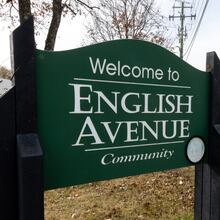Metro Atlanta home prices have gone through the roof over the past decade — and rental costs are headed that way.
Since 2009, the median rent for a two-bedroom home has surged 65% to $1,474, according to an analysis by RentCafé, a property listing service.
It could be worse.
Atlanta ranks 10th highest nationally, behind cities like San Francisco, where the median rent is $3,680, and Washington, D.C., where it is $2,235. Thanks to a spate of new apartment construction, rents also haven't climbed as fast as in cities like Denver, up 85%, or Seattle, up 77%.
Still, renters pay more in Atlanta than in any other city in the South, according to RentCafé. And wages haven't kept up. Household income in Fulton County, for example, is up just 13% from a decade ago, according to the Census Bureau.
There was a time — just a decade or two ago — when rentals were sparser and apartments were mostly urban. Back then, new houses were plentiful. The default for young professionals was to buy — and they would drive however far into the suburbs they had to go to find places that were affordable.
But the median home price as soared 98% since 2009 to $251,125,according to calculations by RentCafé.
Since the last housing crash, which began a dozen years ago in Atlanta, the rate of home ownership has fallen nationally, and fallen even farther in Atlanta. Much of that was surely involuntary, thanks to an estimated quarter-million foreclosures in the region.
Since the economy rebounded, the metro economy has added more than 650,000 jobs and drawn a steady flow of young residents, many with good jobs with good pay. Yet many are still choosing to rent.
In Fulton County, fewer than 55% of households are occupied by owners, down from more than 60% a decade ago, according to the U.S. Census Bureau. That change represents more than 20,000 households that are renters not owners.
Why are fewer people buying? Well, it's complicated.
For starters, home prices in much of the city are out of reach for many, especially the newer construction. That’s because rising land prices, particularly intown, have forced developers to build higher-priced homes.
Even moving away from the city, the pace of new homebuilding in metro Atlanta is still barely half what it was before the housing crash. The population of potential buyers might be larger than ever, but the supply of affordable houses is tight, also pushing prices higher.
Those who have strong incomes often have not amassed the savings they need to make a down payment for a house.
Moreover, in some areas, there is a mismatch, with rent being a lot more affordable than a house.
In Alpharetta, for example, rent for a two-bedroom apartment averages $1,470 a month while home prices average $510,000, according to Apartment List, an online source of rental listings.
Even with loans that permit low downpayments, buyers have to scrape together thousands of dollars, plus the money to pay for appraisal and closing costs.
In the city of Atlanta, the calculus is closer: Apartment List pegs Atlanta's two-bedroom rents at $1,210 a month, while home prices average $257,000.
The economics of buying are more favorable in other parts of the metro region. In Norcross, a two-bedroom apartment costs $1,400 a month while home prices average $234,450. In Stone Mountain, a two-bedroom rents for $1,150 and home prices average $194,450. In Morrow, a two-bedroom apartment rents for about $1,020 and the average home costs $129,900.
Yet the reasons for the shift to renting are as much psychological and demographic as they are economic.
"Usually, it is not a financial decision," said Mitchell Prusin, an associate with Re/Max Around Atlanta Realty.
CASE-SHILLER INDEX SHOWS HOME PRICES RISING
Prusin says he often finds himself trying to convince millennials of the financial advantages in owning a home.
He points out the tax benefits, the steady aggregation of equity and the chance that a mortgage payment each month could be less than what a renter pays now.
It is often not enough of an argument. Prusin said he hears renters talk — about Atlanta's rebounding intown neighborhoods, about the tech jobs in Midtown, the hip hangouts on the West Side and, especially, the Beltline — all places where prices are high and renting more affordable.
And lot of new residents, he said, just want to be in the city.
Change in median home price, past 10 years
Phoenix: 144%
San Jose: 124%
Denver: 104%
Atlanta: 98%
Los Angeles: 96%
San Francisco: 95%
Seattle: 95%
Las Vegas: 93%
Source: RentCafe
Average two-bedroom apartment rent
San Francisco: $3,680
San Jose: $2,697
Los Angeles : $2,527
Washington, D.C.: $2,235
San Diego: $2,225
Seattle: $2,124
Long Beach: $2,103
Denver: $1,660
Portland: $1,536
Atlanta: $1,474
Source: RentCafe
Average for two-bedroom rents, home prices
Roswell: $1,470 ($450,000)
Alpharetta: $1,470 ($510,000)
Kennesaw: $1,430 ($315,000)
Norcross: $1,400 ($234,450)
Marietta: $1,380 ($359,312)
Peachtree City: $1,380 ($395,000)
Smyrna: $1,340 ($362,200)
Woodstock: $1,340 ($390,140)
Atlanta: $1,210 ($257,000)
Decatur : $1,200 ($252,499)
Sources: Apartment List, Redfin
About the Author






